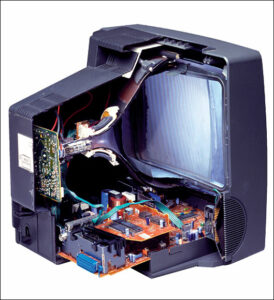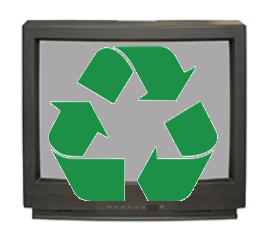PRC is proud to offer a number of Hard to Recycle Collection Events throughout Allegheny County to help local residents responsibly recycle materials that are not accepted into local recycling programs. Over the last 16 years, PRC has worked hard to expand this list to take as many different materials as possible to ensure that they are responsibly recycled.
Each of these products require different processes to be recycled, which is largely why they cannot be collected in your regular curbside recycling. In this Hard-to-Recycle Materials Series, we will be taking a closer look at what happens to the products that you bring to our recycling collection events! Don’t forget to check out our earlier posts on expanded polystyrene and tires. This post will focus on what happens to the TVs, our most recycled item, after they are dropped off.
Why Recycle?
Under the Covered Device Recycling Act of 2010 (Act 108), televisions may not be placed in landfills. You can learn more about Act 108 here.
Televisions (especially older TVs) contain toxic materials including lead, cadmium, beryllium, PVC, Mercury, and brominated flame retardants. These chemicals can leach into groundwater and soil, posing a risk to public health. When televisions are recycled by a certified electronics recycler, these toxic materials are disposed of responsibly.
PRC only works with recyclers who are eStewards certified. The eStewards standard protects against ewaste dumping in landfills, processing by prisoners, and the export of hazardous ewaste to developing countries. It also ensures worker protection and sets strict rules for the security of private data stored in electronics. It is the most rigorous standard for electronics recycling in North America. For the past decade, PRC has worked with certified e-Steward eLoop llc, from Export, Pa to ensure all materials recycled are managed in the most environmentally and socially responsible manner available.
What is Accepted at PRC Hard-to-Recycle Events?
PRC accepts televisions for $30 per unit. Rear projector and console TVs, which are larger and therefore more expensive to process, cost $40 per unit. Rear projector TVs usually sit directly on the floor and are around 3 to 4 feet tall. Console TVs are the ones that are built into a piece of furniture. PRC does not accept televisions that have been disassembled.
What Happens to It?
When you bring your old television to a PRC Hard to Recycle Collection event, it is recycled by eLoop, LLC. As a BAN e-Swards Certified Recycler, eLoop has the highest certification possible for electronics recycling. Televisions are deconstructed by the eLoop team at their location in Export, PA. As much salvageable material as possible is separated while hazardous material is collected and managed responsibly:
- Leaded Glass – CRT televisions screens are made of leaded glass. This glass is perfectly safe to touch, but will began to leach lead if left in contact with water for a long period of time (one the of many reasons why it’s dangerous to illegally dump a television.) The glass is sent to a glass recovery facility with the capacity to handle leaded glass, where it can be recycled.
- Non-Leaded Glass – Newer televisions usually have non-leaded glass screens, which are less toxic and can also be recycled by a glass recovery facility.

Cross section of Cathode Ray Tube TV - Plastic – Televisions contain a variety of plastics. These plastics can be recycled, through a process similar to the process your curbside plastics undergo.
- Circuit Board – Since it contains a number of different metals, the circuit board is broken down into small pieces so that individual precious metals like gold can be extracted and other metals can be recycled as scrap material.
- Cables and Wires – Cables and wires contain metals and often plastics. They are smelted to allow for the recovery of the metal components.
- Materials of Concern – Toxic chemicals, such as lead, cadmium, and mercury, must be responsibly managed. There are several methods to treat hazardous waste prior to final disposal, but they fall into three broad categories: Thermal, Chemical, and Biological. Chemical treatment is the most common way of dealing with electronic materials of concern.
- Cathode Ray Tubes – CRT televisions are named for the vacuum tube that produces their picture. The cathode ray tube is the most difficult part of a CRT television to process, because it contains lead and phosphor, which both must be handled responsibly to avoid environmental risk.
Where Can I Take Televisions for Recycling?
eLoop, LLC
2010 Borland Farm Road, Export PA
724.591.7646
Evolution E-Cycling
2235 Mary St, Pittsburgh, PA
412.390.3451
(Not eStewards Certified but does hold the R2 Certification)
Please note that fees do apply to drop materials off at any of these locations. Please call ahead to determine exact pricing for your television.
For further questions, please feel free to reach out to us!
Oops! We could not locate your form.


